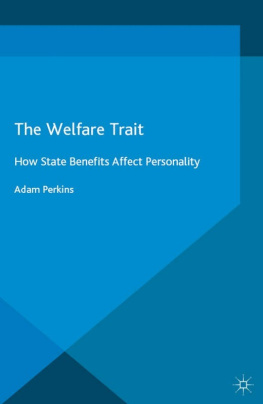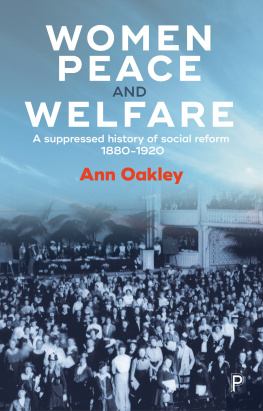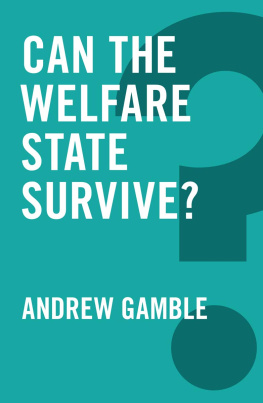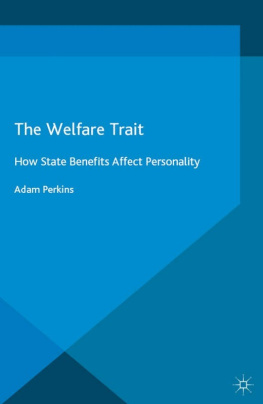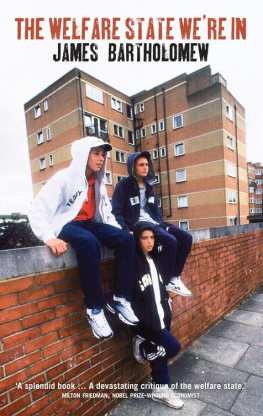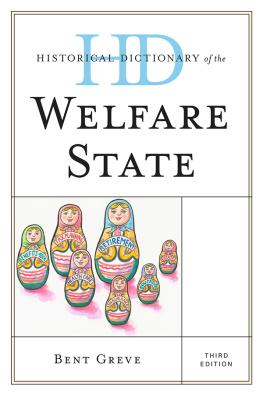The Welfare State Generation
New Directions in Social and Cultural History
Series Editors: Sasha Handley (University of Manchester, UK), Rohan McWilliam (Anglia Ruskin University, UK) and Lucy Noakes (University of Brighton, UK)
Editorial Board:
Robert Aldrich, University of Sydney, Australia
James W. Cook, University of Michigan, USA
John H. Arnold, University of Cambridge, UK
Alison Rowlands, University of Essex, UK
Penny Summerfield, University of Manchester, UK
Mrinalini Sinha, University of Michigan, USA
The New Directions in Social and Cultural History series brings together the leading research in social and cultural history, one of the most exciting and current areas for history teaching and research, contributing innovative new perspectives to a range of historical events and issues. Books in the series engage with developments in the field since the post-cultural turn, showing how new theoretical approaches have impacted on research within both history and other related disciplines. Each volume will cover both theoretical and methodological developments on the particular topic, as well as combine this with an analysis of primary source materials.
Published:
New Directions in Social and Cultural History, ed. Sasha Handley, Rohan McWilliam and Lucy Noakes (2018)
Art, Propaganda and Aerial Warfare in Britain during the Second World War, Rebecca Searle (2020)
Family History, Historical Consciousness and Citizenship: A New Social History, Tanya Evans (2022)
Forthcoming:
Intersectional Encounters in the Nineteenth Century Archive: Power and Discourse, edited by Rachel Bryant-Davies and Erin Johnson-Williams
Capital Labour in Victorian England: Manufacturing Consensus, Donna Loftus
British Humour and the Second World War: Keep Smiling Through, edited by Juliette Pattinson and Lindsey Robb
Captive Fathers, Captive Children: Legacies of the War in the Far East, Terry Smyth
Capital and Labour in Victorian England: Manufacturing Conensus, Donna Loftus
The Welfare State Generation
Women, Agency and Class in Britain since 1945
Eve Worth
For my mum, Jan.
Contents
First and foremost, I would like to thank the women who were interviewed for this project. I feel incredibly honoured that you shared your life stories with me. You have helped me to think in much more interesting ways about womens lives in recent history.
I am grateful to the AHRC (grant no: AH/K503198/1) and Queens College, Oxford, for funding the first stages of my research. Thank you also to Women in the Humanities and St Hildas College, Oxford, for providing such a stimulating and supportive intellectual environment in which to write this book. Extra special thanks are owed to Sheila Forbes, and to my incisive supervisor Selina Todd. It has been a pleasure to share and develop ideas with both Helena Mills and Laura Paterson at various stages of this research. Christina de Bellaigue has come to be a great friend and intellectual collaborator. The Rags to Riches network at The Oxford Research Centre in the Humanities, that I have been a part of since its inception, has been so valuable to my research on social mobility. There is a community of women scholars in the Oxford History Faculty who have always been so supportive of my research; these include Kathryn Gleadle, Senia Paseta and Sin Pooley.
This research has been enriched by the opportunities that I have had to engage at conferences and talks with the amazing set of historians currently working on the recent history of Britain. NACBS, SHS and MBS were particular highlights in pre-Covid times. I would like to especially thank Pat Thane and John Davis, who encouraged me to write a book out of this research, and Jon Lawrence and Helen McCarthy, who have helped me so much as a postdoctoral scholar. My thinking has also benefitted from the rich resources of the Bodleian Library, the Mass Observation Archive at the University of Sussex, and the Labour and Conservative Party archives.
Bloomsbury, and particularly Abigail Lane, have made the book writing process so smooth. I am indebted to the editors of the New Directions in Social and Cultural History series who have really believed in this book. Thanks also to the reviewer who offered such thoughtful comments on the manuscript.
Finally, thank you so much to my family. Ella is the warmest person yet the sharpest critic, and Ethan always manages to bring the fun. My dad has helped me get through years of study with much-needed patience, eye for detail and for the arc of history. My partner, Martin, offers me endless support and makes every single day better. And my mum, who is the brightest person I know without her insight this project would not have been possible. She has been there to challenge and encourage me every step of the way. This book is dedicated to her.
This book argues that the welfare state has been so fundamental to the life histories of women born in Britain between the late 1930s and early 1950s that these women should be considered the welfare state generation. The post-war expansion of the welfare state was one of the most transformative political changes of the twentieth century, yet we know comparatively little about its development in practice or its long-term impact on those who grew up within it. This is an important historical moment to assess whether the Beveridge promise of cradle to grave welfare provision was achieved because the first generation of women to benefit are now in older age, and they occupy a central role in contemporary debates about the future of the welfare state, rising inequality and intergenerational equity. The Welfare State Generation foregrounds these women and examines the welfare state from below through the lens of their experience. This approach shows that their lives were intertwined with the history of the state as provider, educator and employer in post-war Britain.
Historians of modern Britain have acknowledged the significance of the welfare state expansion on the early lives of post-war children. In both Herons and Steedmans accounts, the significance of the political moment into which they were born was brought into even sharper relief by the contrast with the recent horrors of the Second World War. Women felt compelled to write about their post-war girlhood because it seemed such a unique historical moment. As a result, their autobiographies often stopped once they reached young adulthood.
This book goes beyond post-war womens well-known autobiographical writing to develop a detailed and wider-ranging study analysing the ways in which girls born between the late 1930s and early 1950s related to the welfare state. Important as the accounts produced by Steedman and Heron are, these autobiographical sources shed little light on our understanding of how the welfare state continued to impact the lives of women beyond childhood and youth or the range of womens differing experiences of the state. The Welfare State Generation addresses this lacuna by using an original life history methodology, centring upon my sample of oral testimonies from thirty-six subjects, to analyse womens experiences from their birth in the long 1940s to retirement in the mid-2010s. This produces a much-needed social history of the welfare state in the midst of the broader turn towards social history in British historiography.
As part of the ascendancy of cultural history in the later twentieth and early twenty-first centuries, oral history interviews were primarily analysed by historians for insights into cultural discourses and as forms of narrative constructions and reconstructions of the self. Feminist oral historians such as Penny Summerfield and Lynn Abrams have developed a sophisticated body of oral history theory, which offers specific modes of analysis for understanding womens subject position and relationship to wider cultural scripts in their interviews.



